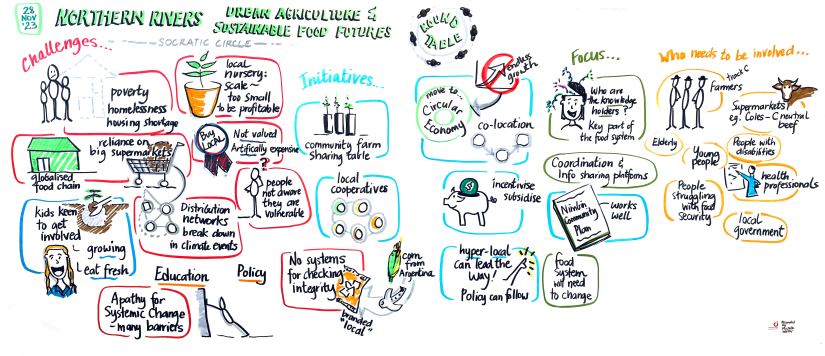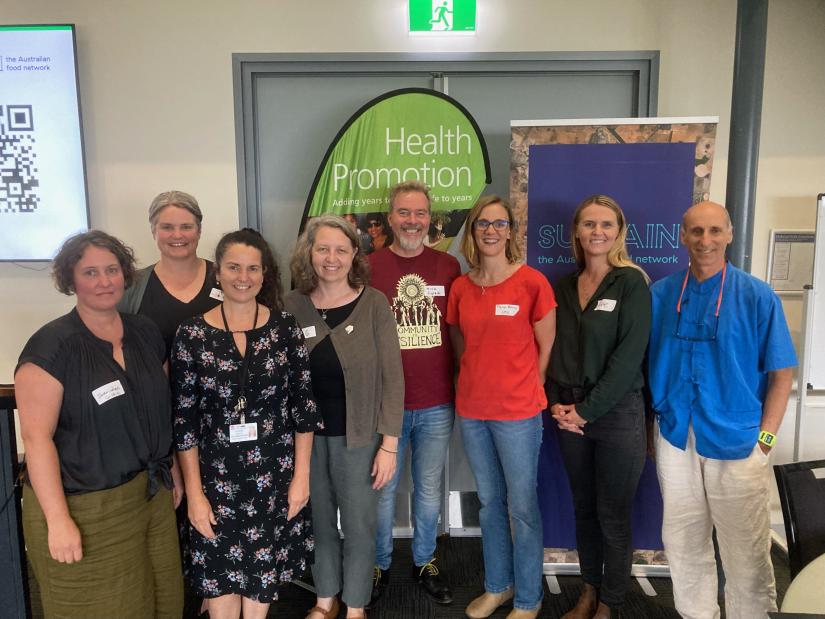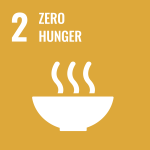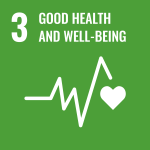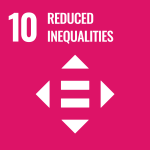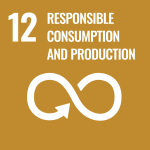Food security, the state of having reliable access to enough affordable, nutritious and culturally appropriate food, is highly vulnerable to shocks and exacerbated by disruptions. In addition to food crises during disasters, everyday food insecurity is on the rise and a growing number of Australian’s struggle to put food on the table. As the problem continues, governance and clear policy and planning to address food insecurity is lacking.
Nowhere is this felt more harshly than the Northern Rivers in the far north of NSW. Following a scoping study of food system resilience in the Northern Rivers by UTS Institute for Sustainable Futures (ISF) researchers in 2023, the Northern NSW Local Health District engaged ISF and Sustain: the Australian Food Network to engage in continued dialogue with the region’s community on food security.
On 28 November 2023, 65 stakeholders from government, First Nations, community and industry, gathered at an Urban Agriculture and Food Futures participatory Roundtable in Northern NSW. Sponsored by Business NSW, Northern Rivers Community Gateway and Indigenous Futures Foundation, this event took place on the lands of the Bundjalung peoples at the Ballina Surf Club as part of the Sustain 2023 Urban Agriculture Month.
The following questions were addressed through presentations, a panel and participatory workshops:
- what are the key challenges to the Northern Rivers food and farming system from health to climate adaptation, food security and reconstruction?
- what roles do key stakeholders play in addressing these challenges?
- what does participatory food system governance look like for the Northern Rivers region?
Roundtable presentations were delivered by the following speakers who discussed the state of play of our Northern Rivers food system including (click link to access video of presentation):
- Kathryn Watson, Northern NSW Local Health District on health and food security
- Tamara Prentice, NSW Department of Primary Industries on land use planning for food production
- Fiona Berry, UTS Institute for Sustainable Futures on food system resilience, policy and planning
Nick Rose, Sustain: The Australian Food Network on food system advocacy & local government best practice.
The conversations in the Socratic Circles surfaced interesting themes of access to land, aging farmers and distribution issues.
– Roundtable participant
A panel of local food champions followed the presenters, speaking to the topics of (click to access videos of presentations):
- Joel Orchard , Young Farmers Connect young farmer advocacy and community food enterprise
- Rebecca Barnes, Playing with Fire Native Foods Indigenous agri-business and native foods
- Jaime Cooper, Consortium of Neighbourhood Centres food security and emergency food relief
- Jolene Ryan, Santos Organics retail and local food security
- Joe Leven , Casino Food Co-op environmentally sensitive agriculture.
Following the presentations participants split up into smaller groups to engage in a reflective dialogue using a Socratic circle process facilitated by Sustain and ISF. In this format group conversation took a democratic approach to sharing ideas, teasing out issues and generating productive conversations with participants.
“The conversations in the Socratic Circles surfaced interesting themes of access to land, aging farmers and distribution issues", one participant said.
Participants highlighted several key challenges facing the Northern Rivers food system including:
- food insecurity – lack of access to food, high price of food and cost of living crisis pushing marginalised populations to rely on food relief services
- supermarket dependency/pricing – lack of locally-owned access to local produce, reliance on out-of-state produce, supermarkets squeezing farmers on price
- land use conflicts/urban sprawl – competing land uses from population shift in the region leading to loss of farmland
- disasters/supply chain disruptions – compounding disasters (floods, bushfires, COVID)
- high land prices/high costs of farming – acting as a barrier to entry for new/young producers and increased vulnerability with high energy/fuel prices
- unsustainable forms of production – monocultures/poor land management practices
- lack of skills and training – no extension support from DPI/no pathways for new farmers
- lack of coordination – no overall cohesive, integrated or supported mechanism to address these challenges.
Participants then identified ways forward to address these challenges:
- local and regional food systems frameworks and coordination – establishment of a community-led regional food coalition/council to develop a regional food plan, supported by government and key legislative, planning and financing frameworks
- diversity, inclusiveness and representation – regional food system plan and governance be multi-sectoral and representative of all key stakeholders
- participation of marginalised voices – ensure voices and perspectives of First Nations people, children and young people, people with disabilities, people experiencing food insecurity and older people are heard and facilitated in this regional framework
- support from State and Federal alongside regional/local government – while the process begins with community-ownership, this work requires local government support but current lack of resourcing locally means state and federal governments are important to provide system-wide planning and funding.
This Roundtable took place just over a year after the NSW Environment and Planning Committee delivered its report into an inquiry into Food Production and Supply in NSW. After the Roundtable concluded, the House Standing Committee on Agriculture related its report on a year-long inquiry into food security in Australia: Australian Food Story.
Subsequently, in the wake of reports of record profits posted by the major supermarkets and continuing high prices for fresh produce, the Federal government announced a Senate Inquiry into Supermarket Pricing. The inquiry will deliver its report by May 2024, as will the NSW Environment and Planning Committee to the Food Production and Supply in NSW inquiry.
RESEARCH OUTPUTS
Northern Rivers Urban Agriculture and Sustainable Food Futures Roundtable (2023) (Report)
media
ABC Landline – ABC iview
Roundtable explores Northern Rivers’ sustainable food future – Northern NSW Local Health District, November 2023
Food a ‘basic human right’ – roundtable explores our sustainable food future – Echo, November 2023
Supermarket shelves were empty for months after the Lismore floods. Here’s how to make supply chains more resilient – The Conversation, June 2023
more information
Improving Food Security and Community Resilience in the Northern Rivers (2022-2023)
Researchers
-
Research Principal
SDGs
This project is working towards UN Sustainable Development Goals 2, 3, 10 and 12.


